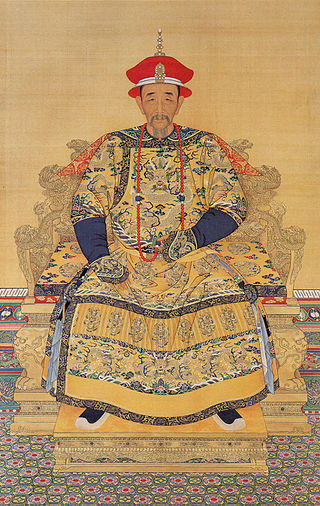
The Kangxi Emperor, also known by his temple name Emperor Shengzu of Qing, born Aisin-Gioro Xuanye, was the third emperor of the Qing dynasty, and the second Qing emperor to rule over China proper, reigning from 1661 to 1722.

The Yongzheng Emperor, also known by his temple name Emperor Shizong of Qing, born Aisin-Gioro Yinzhen, was the fourth emperor of the Qing dynasty, and the third Qing emperor to rule over China proper. He reigned from 1722 to 1735. A hard-working ruler, the Yongzheng Emperor's main goal was to create an effective government at minimal expense. Like his father, the Kangxi Emperor, the Yongzheng Emperor used military force to preserve the dynasty's position.
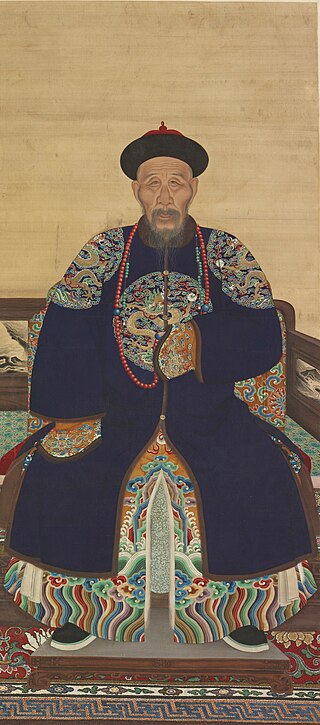
Yunti, born Yinzhen and also known as Yinti before 1722, formally known as Prince Xun, was a Manchu prince and military general of the Qing dynasty.
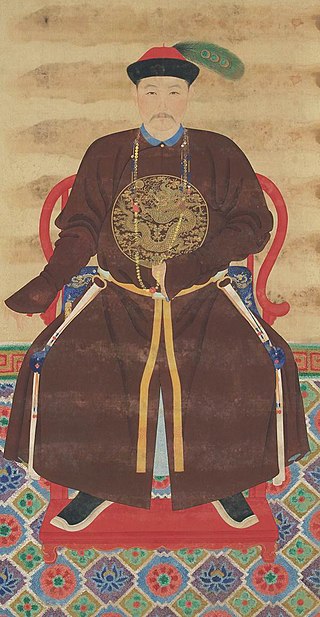
Yunsi, born as Yinsi, was a Manchu prince of the Qing dynasty in China. The eighth son of the Kangxi Emperor, Yunsi was a pivotal figure in the power struggle over the succession to his father's throne. Yunsi was believed to be favoured by most officials in the imperial court to be the next emperor but ultimately lost the struggle to his fourth brother Yinzhen, who became the Yongzheng Emperor.
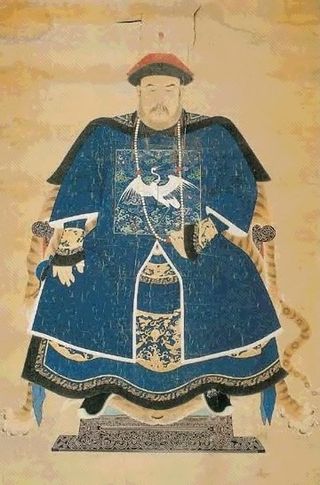
Nian Gengyao, courtesy name Lianggong, was a Chinese military commander of the Qing dynasty. He was born a member of the Han Chinese Bordered Yellow Banner and had extensive military experience on the western frontier of the Qing Empire. Nian became commander-in-chief of the Qing armies in the northwest; and helped to incorporate the region of what is now Qinghai into the Qing Empire.
Hongshi was a Manchu prince of the Qing dynasty. Born to the ruling Aisin Gioro clan as the third son of the Yongzheng Emperor, he was banished from the imperial clan in 1725, ostensibly for supporting his uncle Yunsi, a political rival of his father. He died in disgrace in 1727 but was later posthumously restored to the imperial clan by his younger brother, the Qianlong Emperor.
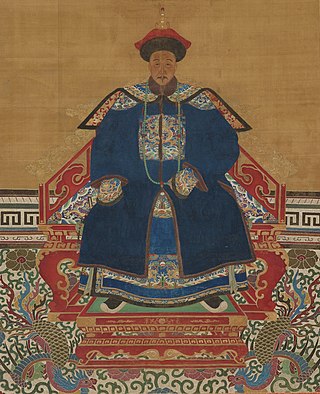
Yinzhi, also known as Yunzhi, was a Manchu prince of the Qing Dynasty.
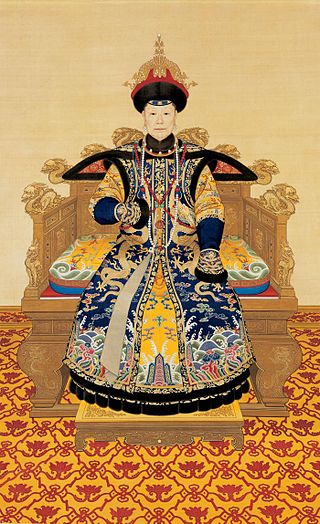
Empress Xiaoshengxian, of the Manchu Bordered Yellow Banner Niohuru clan, was a posthumous name bestowed to the consort of Yinzhen, the Yongzheng Emperor and mother of Hongli, the Qianlong Emperor. She was honoured as Empress Dowager Chongqing during the reign of her son and posthumously honoured as empress, although she never held the rank of empress consort during her lifetime.
Longkodo was a Manchu court official who lived in the Qing dynasty. He was from the Tunggiya clan, which was under the Bordered Yellow Banner. His period of fame lasted from the late Kangxi era to the early Yongzheng era, perhaps most famous for delivering the Kangxi Emperor's disputed will.

Yuntang, born Yintang, was a Manchu prince of the Qing dynasty. He was the ninth son of the Kangxi Emperor and an ally of his eighth brother Yunsi, who was the main rival to their fourth brother Yinzhen in the power struggle over the succession. In 1722, Yinzhen succeeded their father and became historically known as the Yongzheng Emperor, after which he started purging his former rivals. In 1725, the Yongzheng Emperor stripped Yuntang off his beizi title, banished him from the Aisin Gioro clan, and imprisoned him in Baoding. Yuntang died under mysterious circumstances later. In 1778, the Qianlong Emperor, who succeeded the Yongzheng Emperor, posthumously rehabilitated Yuntang and restored him to the Aisin Gioro clan.
Yinzhi, also known as Yunzhi, formally known as Prince Zhi of the Second Rank between 1698 and 1708, was a Manchu prince of the Qing dynasty.

Yunli, born Yinli, formally known as Prince Guo, was a Manchu prince of the Qing dynasty.

Huang Taizi Mishi is a 2004 Chinese television series produced by You Xiaogang. The series is the second instalment in a series of four television series about the history of the early Qing dynasty. It was preceded by Xiaozhuang Mishi (2003), and followed by Taizu Mishi (2005) and Secret History of Kangxi (2006), all of which were also produced by You Xiaogang.

Palace is a 2011 Chinese television series produced by Yu Zheng; starring Yang Mi, Feng Shaofeng, Mickey He and Tong Liya. The series was directed by Lee Wai-chu and starred cast members from mainland China, Taiwan and Hong Kong. The series was first broadcast on Hunan TV in China from 31 January to 21 February 2011. It is later followed by Palace 2 (Chinese: 宮鎖珠帘) (2012), Palace 3: The Lost Daughter, and the film The Palace .
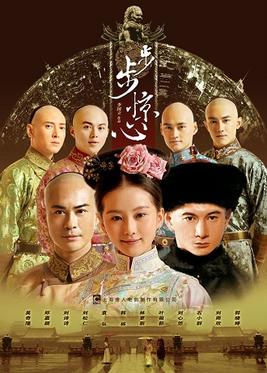
Scarlet Heart is a 2011 Chinese television series based on the novel Bu Bu Jing Xin by Tong Hua. It premiered in China on Hunan Broadcasting System (HBS) on 10 September 2011.

Startling by Each Step, also known as Bubu Jingxin, was Tong Hua's debut novel. Originally published online in 2005 on Jinjiang Original Network (晉江原創網), it was later published by Ocean Press (海洋出版社), National Press (民族出版社), Huashan Arts Press (花山文藝出版社), Hunan Literature and Art Publishing House (湖南文藝出版社), and Yeren Culture Publishing (野人文化出版社). Tong Hua revised the novel in 2009 and 2011. The latest edition contained an additional 30,000 word epilogue.

Palace II is a 2012 Chinese television series written and produced by Yu Zheng and directed by Lee Wai-chu. It is a sequel to the 2011 television series Palace. The series was first broadcast on HBS in China from 20 January to 8 February 2012. It was followed by Palace 3: The Lost Daughter (宫锁连城), and the film The Palace , otherwise known as The Palace: Lock Sinensis (宫锁沉香).

Gilded Chopsticks is a 2014 Hong Kong historical fiction television serial produced by TVB. Set during the reign of the Yongzheng Emperor in the Manchu-led Qing dynasty, the serial follows the adventures of a lazy but gifted "golden-tongued" imperial chef Ko Tin-po, whose clumsy activities lead him to befriend the Yongzheng Emperor during an imperial struggle for the Qing throne. The story is inspired by Jin Yong's wuxia novel The Deer and the Cauldron.

Li Wei the Magistrate, also known as Li Wei Becomes an Official, is a 2001 Chinese television historical comedy-drama starring Xu Zheng as a young Li Wei, an illiterate county magistrate who would become one of the most prominent officials during 18th-century Qing dynasty.
A coup of Hongxi was an unsuccessful coup d'etat organised by Hongxi, Prince Li of the First Rank and the eldest surviving son of deposed crown prince Yunreng and other co-conspirators, most of whom were sons of the imperial princes who did not participate in the succession brawl between Yinzhen, Yunzhi, Yunsi and their supporters.















